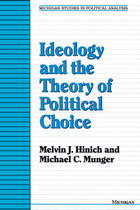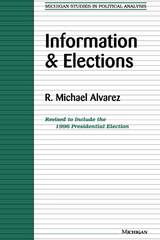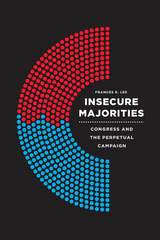130 books about Elections and 6
start with I
130 books about Elections and 6
130 books about Elections
6 start with I start with I
6 start with I start with I

Ideology and the Theory of Political Choice
Melvin Hinich and Michael C. Munger
University of Michigan Press, 1996
There is no unified theory that can explain both voter choice and where choices come from. Hinich and Munger fill that gap with their model of political communication based on ideology.
Rather than beginning with voters and diffuse, atomistic preferences, Hinich and Munger explore why large groups of voters share preference profiles, why they consider themselves "liberals" or "conservatives." The reasons, they argue, lie in the twin problems of communication and commitment that politicians face. Voters, overloaded with information, ignore specific platform positions. Parties and candidates therefore communicate through simple statements of goals, analogies, and by invoking political symbols. But politicians must also commit to pursuing the actions implied by these analogies and symbols. Commitment requires that ideologies be used consistently, particularly when it is not in the party's short-run interest.
The model Hinich and Munger develop accounts for the choices of voters, the goals of politicians, and the interests of contributors. It is an important addition to political science and essential reading for all in that discipline.
"Hinich and Munger's study of ideology and the theory of political choice is a pioneering effort to integrate ideology into formal political theory. It is a major step in directing attention toward the way in which ideology influences the nature of political choices." --Douglass C. North
". . . represents a significant contribution to the literature on elections, voting behavior, and social choice." --Policy Currents
Melvin Hinich is Professor of Government, University of Texas. Michael C. Munger is Associate Professor of Political Science, University of North Carolina.
Rather than beginning with voters and diffuse, atomistic preferences, Hinich and Munger explore why large groups of voters share preference profiles, why they consider themselves "liberals" or "conservatives." The reasons, they argue, lie in the twin problems of communication and commitment that politicians face. Voters, overloaded with information, ignore specific platform positions. Parties and candidates therefore communicate through simple statements of goals, analogies, and by invoking political symbols. But politicians must also commit to pursuing the actions implied by these analogies and symbols. Commitment requires that ideologies be used consistently, particularly when it is not in the party's short-run interest.
The model Hinich and Munger develop accounts for the choices of voters, the goals of politicians, and the interests of contributors. It is an important addition to political science and essential reading for all in that discipline.
"Hinich and Munger's study of ideology and the theory of political choice is a pioneering effort to integrate ideology into formal political theory. It is a major step in directing attention toward the way in which ideology influences the nature of political choices." --Douglass C. North
". . . represents a significant contribution to the literature on elections, voting behavior, and social choice." --Policy Currents
Melvin Hinich is Professor of Government, University of Texas. Michael C. Munger is Associate Professor of Political Science, University of North Carolina.
[more]

INFORMATION AND DEMOCRATIC PROCESSES
John A. Ferejohn and James H. Kuklinski
University of Illinois Press, 1990
The golden democratic tradition
of an informed and involved electorate freely and rationally choosing its public
officials seems to be at odds with American political reality. Thus the questions:
On what basis do people vote and form opinions? How does the lack of information
at the individual level affect system performance? In this collection twenty-six
distinguished political scientists discuss, debate, and define the relationship
between information and the democracy it supposedly serves. The contributors
address both the empirical and normative aspects of governing in the United
States, employing psychological, sociological, and economic perspectives.
of an informed and involved electorate freely and rationally choosing its public
officials seems to be at odds with American political reality. Thus the questions:
On what basis do people vote and form opinions? How does the lack of information
at the individual level affect system performance? In this collection twenty-six
distinguished political scientists discuss, debate, and define the relationship
between information and the democracy it supposedly serves. The contributors
address both the empirical and normative aspects of governing in the United
States, employing psychological, sociological, and economic perspectives.
[more]

Information and Elections
R. Michael Alvarez
University of Michigan Press, 1998
R. Michael Alvarez examines how voters make their decisions in presidential elections. He begins with the assumption that voters have neither the incentive nor the inclination to be well-informed about politics and presidential candidates. Candidates themselves have incentives to provide ambiguous information about themselves, their records and their issue positions. Yet the author shows that a tremendous amount of information is made available about presidential candidates. And he uncovers clear and striking evidence that people are not likely to vote for candidates about whom they know very little. Alvarez explores how voters learn about candidates through the course of a campaign. He provides a detailed analysis of the media coverage of presidential campaigns and shows that there is a tremendous amount of media coverage of these campaigns, that much of this coverage is about issues and is informative, and that voters learn from this coverage.
The paperback edition of this work has been updated to include information on the 1996 Presidential election.
Information and Elections is a book that will be read by all who are interested in campaigns and electoral behavior in presidential and other elections.
"Thoughtfully conceptualized, painstakingly analyzed, with empirically significant conclusions on presidential election voting behavior, this book is recommended for both upper-division undergraduate and graduate collections." --Choice
R. Michael Alvarez is Associate Professor of Political Science, California Institute of Technology.
The paperback edition of this work has been updated to include information on the 1996 Presidential election.
Information and Elections is a book that will be read by all who are interested in campaigns and electoral behavior in presidential and other elections.
"Thoughtfully conceptualized, painstakingly analyzed, with empirically significant conclusions on presidential election voting behavior, this book is recommended for both upper-division undergraduate and graduate collections." --Choice
R. Michael Alvarez is Associate Professor of Political Science, California Institute of Technology.
[more]

Insecure Majorities
Congress and the Perpetual Campaign
Frances E. Lee
University of Chicago Press, 2016
As Democrats and Republicans continue to vie for political advantage, Congress remains paralyzed by partisan conflict. That the last two decades have seen some of the least productive Congresses in recent history is usually explained by the growing ideological gulf between the parties, but this explanation misses another fundamental factor influencing the dynamic. In contrast to politics through most of the twentieth century, the contemporary Democratic and Republican parties compete for control of Congress at relative parity, and this has dramatically changed the parties’ incentives and strategies in ways that have driven the contentious partisanship characteristic of contemporary American politics.
With Insecure Majorities, Frances E. Lee offers a controversial new perspective on the rise of congressional party conflict, showing how the shift in competitive circumstances has had a profound impact on how Democrats and Republicans interact. For nearly half a century, Democrats were the majority party, usually maintaining control of the presidency, the House, and the Senate. Republicans did not stand much chance of winning majority status, and Democrats could not conceive of losing it. Under such uncompetitive conditions, scant collective action was exerted by either party toward building or preserving a majority. Beginning in the 1980s, that changed, and most elections since have offered the prospect of a change of party control. Lee shows, through an impressive range of interviews and analysis, how competition for control of the government drives members of both parties to participate in actions that promote their own party’s image and undercut that of the opposition, including the perpetual hunt for issues that can score political points by putting the opposing party on the wrong side of public opinion. More often than not, this strategy stands in the way of productive bipartisan cooperation—and it is also unlikely to change as long as control of the government remains within reach for both parties.
With Insecure Majorities, Frances E. Lee offers a controversial new perspective on the rise of congressional party conflict, showing how the shift in competitive circumstances has had a profound impact on how Democrats and Republicans interact. For nearly half a century, Democrats were the majority party, usually maintaining control of the presidency, the House, and the Senate. Republicans did not stand much chance of winning majority status, and Democrats could not conceive of losing it. Under such uncompetitive conditions, scant collective action was exerted by either party toward building or preserving a majority. Beginning in the 1980s, that changed, and most elections since have offered the prospect of a change of party control. Lee shows, through an impressive range of interviews and analysis, how competition for control of the government drives members of both parties to participate in actions that promote their own party’s image and undercut that of the opposition, including the perpetual hunt for issues that can score political points by putting the opposing party on the wrong side of public opinion. More often than not, this strategy stands in the way of productive bipartisan cooperation—and it is also unlikely to change as long as control of the government remains within reach for both parties.
[more]

Ireland at the Polls 1981, 1982, and 1987
A Study of Four General Elections
Howard R. Penniman and Brian Farrell, eds.
Duke University Press, 1987
Ireland at the Polls, 1981, 1982, and 1987: A Study of four General Elections is another in the series of national election studies prepared by the American Enterprise Institute for Public Policy Research (AEI). Books in the series include volumes on some thirty national democratic elections around the world. Distinguished foreign and American scholars have contributed to the studies.
[more]

Italy at the Polls, 1983
A Study of the National Elections
Howard R. Penniman, ed.
Duke University Press, 1987
In this book of the At the Polls series, Duke University Press has joined with the American Enterprise Institute for Public Policy Research to publish studies on the electoral process as it functions around the world. Cited by Choice for it's "high standards of scholarly analysis and objectivity", At the Polls provides both a chronicle of events and a thorough analysis of the elections results.
[more]
READERS
Browse our collection.
PUBLISHERS
See BiblioVault's publisher services.
STUDENT SERVICES
Files for college accessibility offices.
UChicago Accessibility Resources
home | accessibility | search | about | contact us
BiblioVault ® 2001 - 2024
The University of Chicago Press









